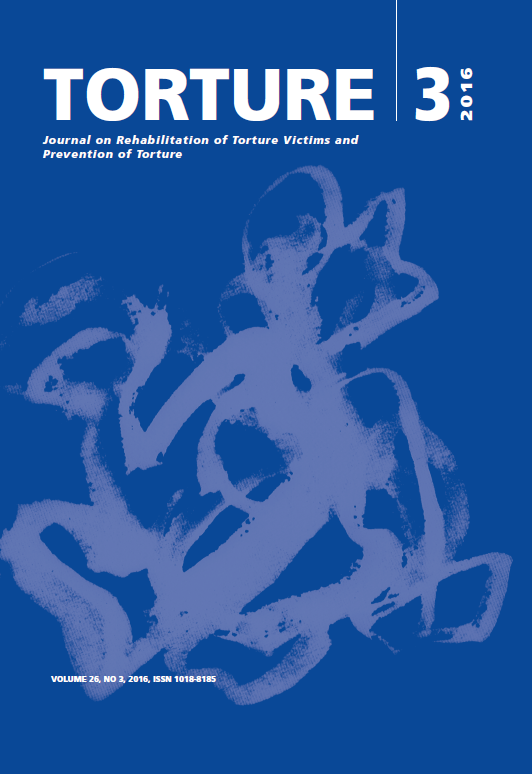Incommunicado detention and torture in Spain, Part II: Enhanced credibility assessment based on the Istanbul Protocol
DOI:
https://doi.org/10.7146/torture.v26i3.109330Keywords:
Standard Evaluation Form for Credibility Analysis (SEC), torture, forensic science, Istanbul Protocol, incommunicado detention, Spain, Basque Country, allegations, ill-treatmentAbstract
Background: The Istanbul Protocol (IP) is the key instrument in the documentation of allegations of torture. However, few scientific studies have evaluated its effectiveness as a tool to assess credibility of allegations of ill-treatment or torture.
Objective: Present data on the credibility of allegations of torture in a sample of 45 Basque people held in short-term incommunicado detention between 1980 and 2012, using a modified version of the Standard Evaluation Form for Credibility Assessment (SEC), a new tool to assess credibility based on the IP.
Method: Each case was evaluated by two psychiatrists, a psychologist and a physician through a layered system of simultaneous, independent assessments, blind audits, and peer-review processes. Clinical interviews following the IP were contrasted with psychometric tests and external documentary evidence by independent experts. All available data were structured using the SEC and cases were accordingly classified as having Maximum consistency, Highly Consistent, Consistent or Inconsistent.
Findings: According to the SEC, 53% of allegations of torture were considered to have Maximum Consistency, 31% Highly consistent, 15% Consistent and 0% Inconsistent. The items that most contributed to the overall credibility assessment came from the psychological evaluation, including the description of alleged torture, emotional reactions, objective functional changes, changes in identity and worldviews and clinical diagnosis. There was little contribution from previous medical reports.
Interpretation: When applied competently, the IP is an essential tool in the documentation of torture. Our study shows: (a) evidence that allegations of ill-treatment and torture in the Basque Country are consistent and credible, being ascertained beyond reasonable doubt and aside from any political debate; (b) the wider use of the IP as a tool to assess credibility of allegations of ill-treatment and torture; and, (c) the usefulness of the SEC as a tool. The SEC can help as a tool for documenting torture in contexts where there are political differences and figures are distorted as a result of polarized political debates, and where legal documentation is needed for judicial purposes. Forensic science can help by providing an objective assessment of the credibility of allegations.
References
2. UN Office of the High Commissioner for Human Rights (OHCHR), Manual on the Effective Investigation and Documentation of Torture and Other Cruel, Inhuman or Degrading Treatment or Punishment - Istanbul Protocol, 2004, HR/P/ PT/8/Rev.1 Available from: http://www.unhchr. ch/ pdf/8istprot.pdf
3. United Nations General Assembly Resolution 55/89, Add 1, 2000 December 4th.
4. Iacopino V, Ozkalipci O, Schlar C. The Istanbul Protocol: international standards for the effective investigation and documentation of torture and ill treatment. Lancet. 1999 Sep 25;354:1117.
5. Moreno A, Iacopino V. Forensic investigations of torture and ill-treatment in Mexico: A follow-up study after the implementation of the Istanbul Protocol. J Leg Med. 2008 OctDec;29(4):443-78.
6. Perera C, Verghese A. Implementation of Istanbul Protocol for effective documentation of torture– review of Sri Lankan perspectives. J Forensic Leg Med. 2011 Jan;18(1):1-5
7. Pérez-Sales P. Standard Evaluation Form for Credibility Analysis. A new tool to assess credibility based on the Istanbul Protocol. In: PérezSales P. Psychological Torture: definition, evaluation and measurement. Do you know the location of the publisher? London-New York: Routledge; 2016. pp. 314-324.
8. Argituz, AEN, Ekimen Elkartea, GAC, JaikiHadi, OME, OSALDE, Departamento de Psicología Social (UPV/EHU). Incommunicado detention and torture. Assessments using the Istanbul protocol. Bilbao: Ekimen Ed. and Irredentos Libros; 2014.
9. Petersen HD, Morentin B, Callado LF, Meana JJ, Hougen HP, Idoyaga MI. Assessment of the quality of medical documents issued in central police stations in Madrid, Spain: the doctor’s role in the prevention of ill-treatment. J Forensic Sci. 2002 Mar;47(2):293-8.
10. Morentin B., Petersen H.D., Callado L.F., Idoyaga M.I., Meana J.J. A follow-up investigation on the quality of medical documents from examinations of Basque incommunicado detainees. The role of medical doctors and national and international authorities in the prevention of ill-treatment and torture. Forensic Sci Int. 2008 Nov 20;182(1-3):57-65.
11. Report of the Special Rapporteur on the promotion and protection of human rights and fundamental freedoms while countering terrorism, 2008. A/HRC/10/3/Add.2, dated 16 December 2008.
12. Amnistía Internacional. La tortura como receta. De las leyes anti-terroristas a la represión de la primavera árabe, Junio 2011.
13. European Committee for the Prevention of Torture (CPT). Special recommendations after the visit of May 30 to June 13, 2011. Available from: http://www.cpt.coe.int/documents/esp/2013-06inf-esp.pdf. (See also all other reports on Spain available from: http://www.cpt.coe.int/).
14. Terwindt C. Were They Tortured or Did They Make That Up? Ethnographic reflections on torture allegations in the Basque Country in Spain. Oñati Socio-Leg Ser. 2011;1(2).
15. United Nations Economic and Social Council. Report of the Special Rapporteur on the question of torture. Civil and political rights, including the question of torture and detentions. Visit to Spain. E/CN.4/2004/56/add.2, 2004. Available from: http://www.unhchr.ch/Huridocda/Huridoca.nsf/(Symbol)/E.CN.4.2004.56. Add.2.En?Opendocument.
16. Audiencia Nacional. Sala de lo Penal. Sección Primera. Sentencia nº 26/2014. Available from: http://www.naiz.eus/media/asset_publics/resources/000/089/292/original/ 2014-6-11_Sentencia_SEGI_I.pdf.
Downloads
Published
How to Cite
Issue
Section
License
We accept that some authors (e.g. government employees in some countries) are unable to transfer copyright. The Creative Commons Licence Attribution-NonCommercial-NoDerivatives 4.0 International (CC BY-NC-ND 4.0) covers both the Torture Journal and the IRCT web site. The publisher will not put any limitation on the personal freedom of the author to use material contained in the paper in other works which may be published, provided that acknowledgement is made to the original place of publication.


